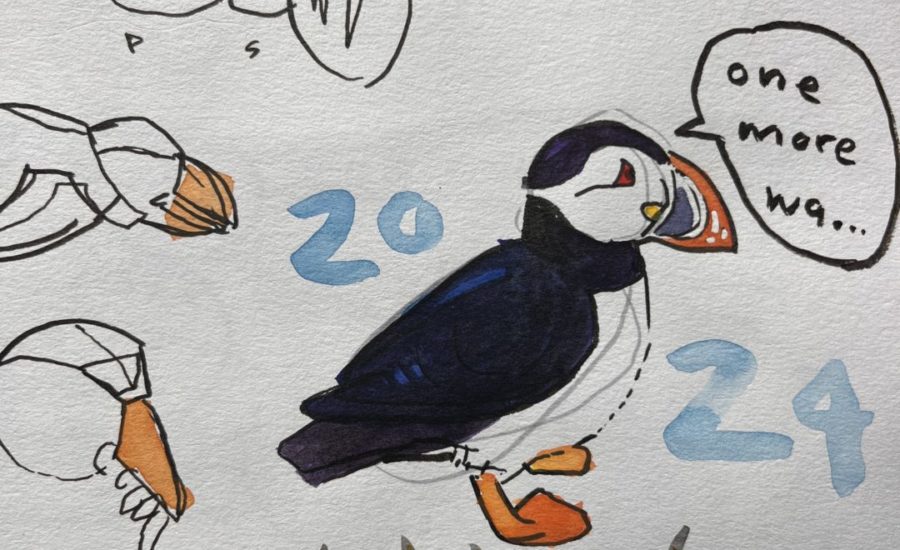Here are some of the key lessons I got from Wild Wonder nature journaling Conference 2024. Did I miss some? Add yours in the comments.
Find joy in the familiar. Cherish what you have. Did you know that several species of seagulls almost went extinct in the 1800s? This year’s conference started with a poem about pigeons and why we do not favor them. Amy Tan talked about her new book the Backyard Bird Chronicles. And Rosemary talked about three of the most underrated familiar birds in her keynote. How can you apply this concept to your nature journaling and life?
Being present. “You must be completely awake in the present to enjoy the tea….”If you are not present you will look into the cup and it will be gone. Life is like that.” This poem by Thich Naht Hahn that Jack read on day three was only one of many reminders of how important being present is. Luckily, nature journaling can help us be present. This is hard in a world with so many distractions and multi tasking.
Pigeons are cool. Did you know that pigeons make milk and feed it to their babies? Learn this and more in Rosemary Mosco’s book The Pigeon Watching Guide.
Comics, comics, comics. There were not any classes this year with comics in the name but they did come up in almost half of the keynotes and classes! That’s because they are an amazingly fun and powerful tool for nature journaling. We made zines in three different classes! Don’t know what a zine is? Check this book out called “Whatcha mean, what’s a zine?!“
Daily Practice is a Superpower: Sofia Gazarian, Nishant Jain, Anastasiia Morozova and more teachers and speakers pointed to the power of a daily practice. Anastasiia talked about it a lot and gave these 5 rules for daily practice.
Make it non negotiable.
Keep it manageable.
Focus on the process not the product.
Everything is allowed.
Make it feel exciting.
Materials are not the most important thing: Yes, it is fun to geek out on art supplies. Yes, buying new art supplies can give you a dopamine hit and maybe even inspire creative work. And yes, there are certain classes and specific techniques that you will not be able to do without the right brush. However, one pattern I have seen at all 6 wild wonder conferences is that students over focus on supplies and teachers say “just work with what you have.” See my upcoming post about supplies to learn which classes it really matters in.
The importance of working fast: It’s not just me that thinks speed is super important for for nature journaling. Multiple instructors spoke about the importance of getting stuff on the page quickly and developing the ability to draw fast.
“Speed will kill the critic” Kate Rutter
“Speed is very helpful” Brooke Morales
It’s ok. Sofia Gazarian thought that “It’s ok” should be the slogan for the conference because so many teachers said this during their classes. I think this is a reminder that if you mess up with your drawing what is the worst that can happen? Will someone die or get hurt? Will people throw tomatoes at you on the street? Fear of making a mistake can prevent us from starting and that is the only way you can really ruin a drawing. And as Claire Giordano said, “Mistakes can have the biggest impact on our learning.”
Take the class you don’t want to take: Sometimes, we trick ourselves with stories about what we like, what we don’t like, and what our style is. This can lead us to avoid the classes or media that we could learn the most from. Learning is often slightly uncomfortable. However, you can train yourself to seek this feeling out. What were the uncomfortable classes for you?
Practicing gouache painting was very hard for me to work from dark to light. I kept falling back into the watercolor pattern of going from light to dark. The discomfort in the process to me was a sign that I was learning. Sometimes, doing the opposite of what you are used to can help you reach a new level of your creativity or skill.
Your brain can change: Neuroplasticity research in the last decades has shown that it is possible to learn and change your mind at any stage in your life. This research was presented in John Muir Law’s final keynote. He showed how nature journaling is a learned skill and a mindfulness practice that can change your brain and help you be a happier, more observant, more open minded person.
Follow your curiosity: The final takeaway and something that came up in several classes and talks was the importance of being true to your own curiosity. From a moth love story with Akshay to Nishant’s suggestion that tapping into your curiosity is the only way to have a sustainable art practice.
What were your key takeaways? Let me know in the comments what were the main lessons you got from Wild Wonder 2024.
Don’t know anything about Wild Wonder Conference?
You can learn more here and get the video pass.
This page contains some amazon affiliate links meaning I get a few cents when you make a purchase at no extra cost to you. This is one of the few ways that I am able to make money from my education work. Thank you.
Want to see more conference coverage?
I have a playlist with 27 videos from the conference! From interviews with teachers to daily summaries and showing you my sketchnotes.
You Can Still Get the Video Pass for the Conference
Do you still need more help getting started with nature journaling?
Regardless of your experience, we got you right here. Below are links to some super resources for beginner nature journalers.
